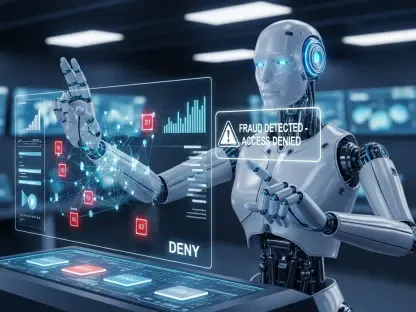Securing a global retail behemoth like Walmart presents unique challenges, given its expansive digital infrastructure, extensive third-party supply chains, and millions of customers. Achieving this herculean task requires robust, adaptable cybersecurity measures, a proactive approach to emerging technologies, and a widespread dedication to fostering a security culture across its global operations. By employing a multifaceted strategy that prioritizes both technological advancement and human factors, Walmart ensures the protection of its customers’ data and business operations on a global scale.
Cybersecurity Challenges in Retail
Retailers like Walmart face unique cybersecurity challenges, primarily due to their vast digital networks sprawling across numerous countries. The diversity of systems and the vast amount of data handled make them prime targets for cyberattacks. Additionally, the complexity of integrating various technologies, such as point-of-sale systems, e-commerce platforms, and supply chain management tools, requires meticulous security measures to maintain resilience against threats. These complexities necessitate a robust cybersecurity framework that can adapt to evolving threats and maintain the integrity of vital systems.The supply chain is an essential aspect of retail operations, but it also introduces vulnerabilities. Walmart’s supply chain includes technological suppliers and merchandise suppliers, each with potential cybersecurity risks. Ensuring that these suppliers adhere to stringent security standards can be daunting, but it is a necessary step to protect the overall system. By implementing rigorous vetting processes and continuous monitoring, Walmart mitigates the risks associated with third-party suppliers, ensuring that both technological and merchandise supply chains operate securely.
Security Culture and Awareness
Developing a robust security culture is fundamental to Walmart’s cybersecurity strategy. With a workforce of 2.1 million associates globally, creating a standardized yet adaptable training program is crucial. Walmart customizes security awareness training to fit the diverse cultural and role-specific needs of its employees. This personalized approach ensures that every associate understands the importance of security in their daily tasks. This effort is driven by a dedicated team focused on fostering a security-minded culture and managing global training programs to maintain high levels of security awareness.To drive this initiative, Walmart has put together a dedicated team focused on fostering a security-minded culture. This team is responsible for managing global training programs and ensuring that security measures are ingrained at every level of the organization. Regular updates and training sessions keep employees well-informed about new threats and best practices, making security a continuous learning process rather than a one-time event. This entrenched culture of security awareness helps build a more resilient organization that can effectively respond to emerging threats.
Supply Chain Security
Supply chain security is a critical area of focus for Walmart. The company implements rigorous vetting processes for its technology suppliers, ensuring they comply with strict security standards. This approach helps to mitigate potential risks stemming from the integration of new technologies into their systems. By maintaining close relationships and transparent communication with suppliers, Walmart can enforce compliance with its stringent security policies and thus safeguard its digital infrastructure.Additionally, Walmart closely monitors its retail supply chain, which is responsible for restocking stores. Merchant teams, who handle logistical challenges daily, are equipped with contingency plans to manage cybersecurity disruptions. When smaller product suppliers lack the resources to address security incidents themselves, Walmart steps in to ensure continuity and protection, demonstrating its commitment to comprehensive security. This proactive stance not only secures the supply chain but also strengthens partnerships with smaller suppliers, fostering a more secure and resilient ecosystem.
Incorporation of AI
Artificial Intelligence (AI) is becoming increasingly crucial in Walmart’s cybersecurity measures. By actively exploring AI capabilities, the company aims to drive efficiencies and enhance security. For instance, AI can automate threat detection and response, significantly reducing the time needed to identify and mitigate potential breaches. By integrating AI into its cybersecurity framework, Walmart can process vast amounts of data at high speeds, enabling more accurate and timely threat detection and response.Ethical and responsible AI use is prioritized within Walmart. The company has established guiding principles to ensure that AI tools are utilized appropriately and securely. Educating associates about the risks and benefits of AI, particularly when interacting with internet-facing tools, is a core element of these guidelines. This balanced approach helps harness the power of AI while safeguarding sensitive information. Walmart’s commitment to ethical AI underscores its responsibility not just to leverage cutting-edge technology but also to protect the privacy and data integrity of its customers.
Addressing the Cyber Skills Gap
One of the pressing challenges in modern cybersecurity is the skills gap. Continuous learning and investment in associate education are key components of Walmart’s strategy to bridge this gap. Through initiatives like Live Better University, Walmart partners with academic institutions to offer degrees in cybersecurity and technology, providing pathways for associates to gain essential credentials. This investment in human capital ensures that Walmart’s workforce is well-equipped to handle the demands of modern cybersecurity.The School of Cybersecurity, launched via Walmart’s global tech center in India, further strengthens this initiative. With over 200 domain-specific courses, associates can specialize in areas such as cryptography or network security. These programs ensure that Walmart’s cybersecurity workforce is equipped with up-to-date skills and knowledge, ready to tackle evolving threats. By fostering a culture of continuous learning and professional development, Walmart helps bridge the cybersecurity skills gap, making it an attractive place for aspiring cybersecurity professionals.
Evolving Cybersecurity Skills
As technology advances, the required skill sets in cybersecurity have also evolved. Earlier systems were primarily designed for data sharing and lacked intrinsic security measures, making them vulnerable to attacks. Today, security is integral to the design and implementation of technological systems, reflecting a significant shift in cybersecurity practices. This evolution necessitates a workforce that is adept in modern technologies and methodologies, emphasizing the importance of ongoing professional development in cybersecurity.Modern security teams must understand the intricate details of system architecture and be proficient in cutting-edge technologies such as cloud computing and machine learning. This evolution emphasizes the importance of ongoing education and adaptability, ensuring that cybersecurity professionals can effectively manage emerging threats while supporting business objectives. Walmart’s focus on evolving cybersecurity skills highlights its commitment to staying ahead of technological advancements, thereby securing its operations and customer data more robustly.
Current Cybersecurity Concerns
Ensuring the effectiveness of security controls and remaining adaptable to unforeseen risks are ongoing challenges for Walmart. This requires continuous assessment and refinement of existing measures. Staying informed about business strategies and emerging technologies is crucial for identifying new vulnerabilities and developing robust security protocols. By maintaining a proactive stance, Walmart can better anticipate potential risks and implement measures to mitigate them effectively.A proactive approach helps Walmart anticipate potential threats and adapt its security measures accordingly. By maintaining flexibility and vigilance, the company can respond swiftly to emerging risks, thereby safeguarding its digital infrastructure and protecting its customers’ data. This adaptability is crucial in an environment where cyber threats are constantly evolving, necessitating a dynamic and responsive cybersecurity framework.
Cybersecurity as an Enabler of Business Success
Securing a global retail giant like Walmart involves overcoming unique challenges due to its extensive digital infrastructure, substantial third-party supply chains, and millions of customers worldwide. To manage this complex task, Walmart needs robust and adaptable cybersecurity measures and a proactive approach to integrating emerging technologies. Building a strong security culture across its global operations is equally vital. This multifaceted strategy ensures that both technological innovations and human factors are prioritized, safeguarding not only the customers’ data but also the integrity of business operations.For a retailer on Walmart’s scale, escalating cyber threats necessitate sophisticated defenses. These measures include constant monitoring for vulnerabilities, regular updates to security protocols, and partnerships with cybersecurity experts. Additionally, employee education programs play a crucial role in maintaining a vigilant workforce that can recognize and combat security threats effectively.Furthermore, Walmart’s dedication to security extends to its supply chain, mandating strict compliance protocols for third-party vendors and leveraging advanced technologies like blockchain to ensure transparency and security. By balancing technological advancements with a strong culture of awareness and preparedness, Walmart successfully protects its global operations and customers, ensuring a secure and reliable shopping experience.









